- Lyrics & Music: Kazuya Yoshii
- Arrangement: The Yellow Monkey
Original Lyrics
悲しみの雨がやみ 希望の空の下で
孤独の服で着飾った 君の手を強くつかんで
あざやかな恋をして ささやかな夢を見て
プレゼントのリボンのように ときめく君と結ばれたい
胸の真ん中を刺激する 熱い想いに包まれて
くちづけすれば 暗い夜空に朝日がのぼるだろう
桜舞い散る春も ひまわり耐える夏も
コスモスが恋する秋も フリージアの眠る冬も
あぁ毎日君を感じている 真実の愛に飢えている
時間を見つめ叫んでいた 世界の果てに花束を
胸の真ん中を刺激する 甘い香りに包まれて
さあ踊るのさ キズも涙も今は捨ててしまおう
太陽が燃えている ギラギラと燃えている
二人が愛し合うために 他に何もいらないだろう
そのくちびる僕のために この愛を君のために
耳もとで囁くのさ
君のからだの中 太陽が燃えてる
いくつもの涙をこらえながら いくつもの夜を越えて
生きていられるだけの 愛が必要だから
太陽が燃えている ギラギラと燃えている
二人が愛し合うために 他に何もいらないだろう
そのくちびる僕のために この愛を君のために
生まれ変ってもまた会おう 同じ場所でまた会おう
太陽が燃えている 太陽が燃えている
抱き合って囁くのさ
君のからだの中 僕のからだの中 太陽が燃えてる
Romanized Lyrics
kanashimi no ame ga yami kibou no sora no shita de
kodoku no fuku de kikazatta kimi no te wo tsuyoku tsukande
azayaka na koi wo shite sasayaka na yume wo mite
present no ribbon no you ni tokimeku kimi to musubaretai
mune no mannaka wo shigeki suru atsui omoi ni tsutsumarete
kuchizuke sureba kurai yozora ni asahi ga noboru darou
sakura maichiru haru mo himawari taeru natsu mo
cosmos ga koi suru aki mo freesia no nemuru fuyu mo
aa mainichi kimi wo kanjite iru shinjitsu no ai ni ueteiru
jikan wo mitsume sakende ita sekai no hate ni hanataba wo
mune no mannaka wo shigeki suru amai kaori ni tsutsumarete
saa odoru no sa kizu mo namida mo ima wa sutete shimaou
taiyou ga moeteiru gira gira to moeteiru
futari ga ai shi au tame ni hoka ni nani mo iranai darou
sono kuchibiru boku no tame ni kono ai wo kimi no tame ni
mimi moto de sasayaku no sa
kimi no narada no naka taiyou ga moeteru
ikutsumo no namida wo koraenagara ikutsumo no yoru wo koete
ikite irareru dake no ai ga hitsuyou dakara
taiyou ga moeteiru gira gira to moeteiru
futari ga ai shi au tame ni hoka ni nani mo iranai darou
sono kuchibiru boku no tame ni kono ai wo kimi no tame ni
umarekawatte mo mata aou onaji basho de mata aou
taiyou ga moeteiru taiyou ga moeteiru
daki atte sasayaku no sa
kimi no karada no naka boku no karada no naka taiyou ga moeteru
Translated Lyrics
The rain of sadness stops, beneath the sky of hope
Holding your hand tightly, dressed up in lonely clothes
Falling into a love so vivid, having dreams that are so modest
I want to be tied to you, heart pounding with excitement, like the ribbon on a present
Enveloped in passionate feelings that excite something in the heart
If we kissed, the morning sun would probably rise in the night sky
In the spring when the cherry blossoms flutter, the summer when the sunflowers endure
The autumn when the cosmos falls in love, and the winter when the freesia sleep
Ahh, I feel you every single day, starved for true love
I was staring at time and crying out, offering up a bouquet at the end of the world
Enveloped in a sweet scent that excites something in the heart
Let’s dance, and cast aside all of our wounds and tears now
The sun is burning, burning bright
We don’t need anything else in order to love each other
Your lips are for me, my love is for you
It whispers in your ear
Within you, the sun is burning
Holding back so many tears as we go through so many nights
We need love just to be able to live
The sun is burning, burning bright
We don’t need anything else in order to love each other
Your lips are for me, my love is for you
Let’s meet again if we’re reborn, let’s meet again at the same place
The sun is burning, the sun is burning
It whispers as we hold one another
Within you, within me, the sun is burning
Notes
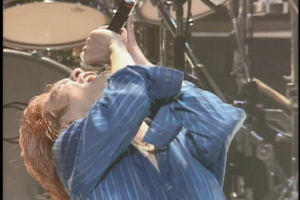
(Four Seasons tour, 1996)
“Taiyou ga Moeteiru” was the band’s 8th single, released on September 30th 1995. The album version was called “Overture ~ taiyou ga moeteiru”, and featured an intro not found on the single version. The song was also featured as the theme song for a few different shows over a wide period of time: The opening theme song for the TV Asahi sports program “J League AGOGO!!” in 1995, the ending theme to “Go-chan. GIRL’S TV” in 2013, and the opening theme song to “musicru TV” for June 2017 (though this was the re-recorded version from “The Yellow Monkey Is Here. New Best”). It was also included as a track in the 2005 Nintendo DS rhythm game “Osu! Tatakae! Ouendan” (though like all the songs in this game, it was not performed by the original artist).
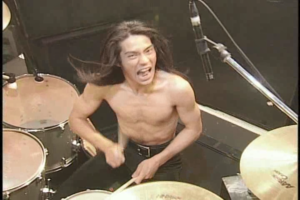
It was the band’s first single to crack the top ten on the Oricon charts (at number 9), and it was very much a song designed to do so. And though the album Four Seasons achieved this goal in general, “Taiyou ga Moeteiru” was the vanguard in ushering in a whole new set of fans for the band due to its mainstream appeal. But this in turn resulted in some older fans being dissatisfied with the direction the group seemed to be going in. A fact that haunted Yoshii for quite some time:
You could say that “Taiyou ga Moeteiru” was my last resort, or sort of a foul in its own way. And that’s because it made a lot of the fans that had stuck with us since the old days really mad: They were like “What the hell is this song!?”. They were really scathing toward us, saying that The Yellow Monkey didn’t need to be doing songs like this. What the hell is this new, eloquent route that we were on?! And so this time I felt afraid that I’d abandoned the people who had supported me, so I just couldn’t feel any joy in it. It was all just really, really frustrating! That’s why I didn’t leave anything on the table for “Sicks”, the next album after this one. When we released it I was just thinking “God dammit you guys!”.
Kazuya Yoshii, In Search of Lost Love (Ushinawareta Ai wo Motomete)
Well…I guess it was really half and half. “Taiyou ga Moeteiru” is, well…not really written in my usual style, is it? It doesn’t really have any of my song writing quirks in it, and if I’m being honest I didn’t put a whole lot of thought into the lyrics. It’s a song that was written with very pure feelings, but maybe it didn’t particularly have much danger, charm, or desire to it? Keep in mind I didn’t think that about the album as a whole, mostly just this song. I’m able to look at it in a completely different light these days, but that’s how I felt back then. I was always wondering what long-time fans of the band would think of the song as I was writing it, and I felt really sorry that I couldn’t make a lot of them happy and still bring in a lot of new fans as well.
Kazuya Yoshii, In Search of Lost Love (Ushinawareta Ai wo Motomete)
More importantly though, it acted as a catalyst for change within Yoshii himself, which consequently made Four Seasons the type of album that it was:
When we played our first time at the Hibiya Open Air Concert Hall the previous year, I was asked what a concert there would be like from a band who didn’t particularly make you think of nature, like the sun and the sky. And my answer to that was they’d probably sing songs like “Taiyou ga Moeteiru” and “Sora no Ao to Hontou no Kimochi”. It took a little bit of courage to get to that point, but I sung them because I was confident about what was inside of me. Those songs were so much fun to write, but…When I asked myself whether or not they brought out all of the appeal in my song writing, I realized that they weren’t quite there yet.
Kazuya Yoshii, In Search of Lost Love (Ushinawareta Ai wo Motomete)
When I talked to a fortune teller for that, she told me “Even though you have this sun that burns so brightly in your heart, you’re blocking it out with a bunch of different threads within yourself”, and that really startled me. While I feel that I have this really strong light within myself, I’ve always thought there was something preventing me from showing it. When we were recording the single “Taiyou ga Moeteiru”, I thought to myself “Ahh, I found those threads”.
Kazuya Yoshii, Rockin’ On Japan Interview (October 1995)
It was also a particular point of pride for the band’s then director Hiroyuki Munekiyo, who said this when asked what his favorite song of the band’s was:
For me it’s “Taiyou ga Moeteiru”. I think their best album is “Four Seasons”, and “Taiyou ga Moeteiru” is a very important song for that album. When I’m talking with new artists about song writing, I use that song as an example. And when I mention “This is the secret of why this sold so well” in talking about songs I was involved with, there’s a lot of persuasive power in that.
Hiroyuki Munekiyo, Natalie.mu Interview (2013)
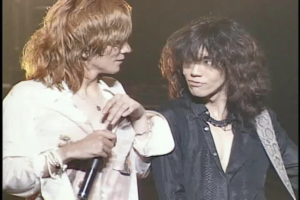
This is a very well constructed song that was so incredibly important to the band’s future. But it’s never been a favorite of mine (though I certainly don’t mind listening to it) simply because it just doesn’t have any of Yoshii’s song writing character in it at all. I completely understand why it didn’t, but typically he puts his stamp even on pop songs. The fact that it’s missing here is just a bit too noticeable. I feel like this is a song that could be sung by any other band almost just as effectively. I’m glad that this style of song ended up mostly just being a stepping stone for the band, since we’ve not heard anything quite like it since.
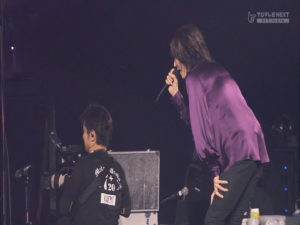
At the time Yoshii was a regular host of the famed radio show All Night Nippon. When he played this song on air, the original B-side was presented as “Wedding Dress”. However when the single was released, the B-side ended up being “Sweet & Sweet”. According to Yoshii, it was because their director shot down the idea of using “Wedding Dress” on the single. That song wouldn’t be released at all until the collection “Triad Years: The Very Best of The Yellow Monkey act II” in 1997.

As mentioned earlier, this song was re-recorded on the 2017 collection “The Yellow Monkey Is Here: New Best”. While I’m a fan of the brass that’s found in the re-recorded version, I prefer the original album version because the Overture intro adds quite a bit of character to the song. In terms of sound quality though, obviously the re-recorded version wins out.
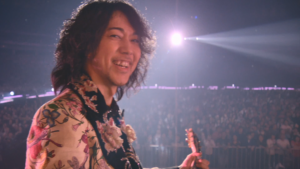
Oddly enough, “Taiyou ga Moeteiru” has made way more appearances in the band’s setlists after their reunion in 2016 than it ever did before. Of course it was originally played during the Four Seasons tour, but not with any regularity during any tours up through their breakup in 2001. I suspect that since the band moved a bit further away from the straightforward sound of Four Seasons as soon as the next album after, they were trying to distance themselves from songs like this a bit.